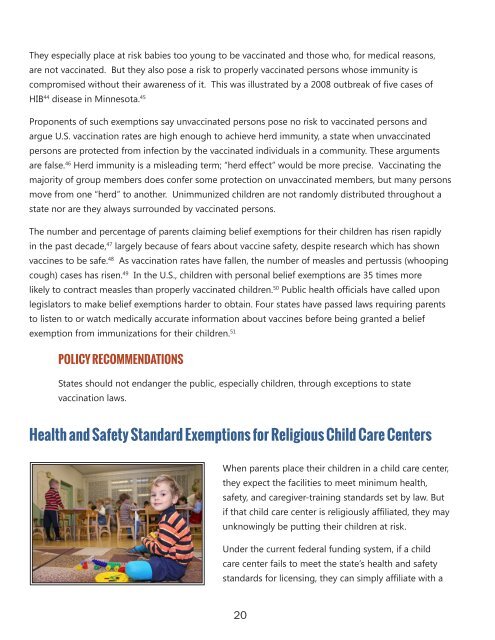They especially place at risk babies too young to be vaccinated and those who, for medical reasons,are not vaccinated. But they also pose a risk to properly vaccinated persons whose immunity iscompromised without their awareness of it. This was illustrated by a 2008 outbreak of five cases ofHIB 44 disease in Minnesota. 45Proponents of such exemptions say unvaccinated persons pose no risk to vaccinated persons andargue U.S. vaccination rates are high enough to achieve herd immunity, a state when unvaccinatedpersons are protected from infection by the vaccinated individuals in a community. These argumentsare false. 46 Herd immunity is a misleading term; “herd effect” would be more precise. Vaccinating themajority of group members does confer some protection on unvaccinated members, but many personsmove from one “herd” to another. Unimmunized children are not randomly distributed throughout astate nor are they always surrounded by vaccinated persons.The number and percentage of parents claiming belief exemptions for their children has risen rapidlyin the past decade, 47 largely because of fears about vaccine safety, despite research which has shownvaccines to be safe. 48 As vaccination rates have fallen, the number of measles and pertussis (whoopingcough) cases has risen. 49 In the U.S., children with personal belief exemptions are 35 times morelikely to contract measles than properly vaccinated children. 50 Public health officials have called uponlegislators to make belief exemptions harder to obtain. Four states have passed laws requiring parentsto listen to or watch medically accurate information about vaccines before being granted a beliefexemption from immunizations for their children. 51POLICY RECOMMENDATIONSStates should not endanger the public, especially children, through exceptions to statevaccination laws.Health and Safety Standard Exemptions for Religious Child Care CentersWhen parents place their children in a child care center,they expect the facilities to meet minimum health,safety, and caregiver-training standards set by law. Butif that child care center is religiously affiliated, they mayunknowingly be putting their children at risk.Under the current federal funding system, if a childcare center fails to meet the state’s health and safetystandards for licensing, they can simply affiliate with a20
church, religious institution or parochial school endorsed bya private religious accrediting agency, and be exempted frommeeting those standards. Depending on the state, this canmean some of these child care centers are not regulated inrelation to the following criteria:Minimum staff-to-child ratios;Minimum staff training requirement; andVarious health, safety, and sanitation standards.POLICY RECOMMENDATIONState standards for child care centers that aredesigned to ensure children’s health and safety and toprovide parents with the assurance their children will bewell cared for are important public policy. Exemptingreligiously affiliated child care centers from theserequirements puts children at risk. Federal and statetaxpayer dollars should benefit only those child carecenters meeting all such health and safety standards.Child Abuse Reporting Exemptions for ClergyThe confidentiality of pastoral communications is fundamental,but not absolute andconfidentiality must bebalanced with children’sessential rights to befree from abuse. Everystate and the District ofColumbia have statutesidentifying those whoare required to reportchild maltreatment underDID YOU KNOW?Religiously affiliated child care centers arenot subject to the health and safety standardsof state licensing laws, even though many aresupported by taxpayer funds.Source: Applied Research Center (now RaceForward, The Center for Racial Justice Innovation),(2009) Categorizing the 14 states with exemptionsfor centers. Table 1. The Applied Research CenterChildcare Report.A 2012 investigative report by Tampa BayTimes found that the Florida Department ofChildren and Families has investigated over 165allegations of abuse and neglect at unlicensedreligious childcare homes in the past ten years,finding evidence to support allegations in 63incidents with a list of offenses that includephysical injury, medical neglect, asphyxiationand sexual abuse.Source: Zayas, A. (2012, Oct 26). Religious exemptionat some Florida children’s homes shields pryingeyes. Tampa Bay Times. Retrieved from http://www.tampabay.com/news/publicsafety/religious-exemption-at-some-florida-childrens-homes-shieldsprying-eyes/1258390In 2007 a number of deaths at teen residentialprograms prompted a nationwide investigationby the Government Accountability Office ofresidential treatment programs for troubledyouths, many of which set themselves upas licensing-exempt religious child carefacilities. The report found the use of extendedstress positions, days of seclusion, strenuouslabor, denial of bathroom access, and death. 1Following the report’s release, the Housepassed legislation to give students accessto child-abuse hotlines and to keep track ofabusive staff members and reports of abuse,but with intervention from the religious right,the bill died in the Senate. 21 U.S. Government Accountability Office. (2007, Oct10). Residential treatment programs: concerns regardingabuse and death in certain programs for troubled youth,testimony before the Committee on Education and Labor,House of Representatives. GAO-08-146T. Retrieved fromhttp://www.gao.gov/new.items/d08146t.<strong>pdf</strong>2 Jones, K. (2011 Jul/Aug) Horror stories from tough-loveteen homes. MotherJones. Retrieved from http://www.motherjones.com/politics/2011/08/new-bethany-ifbteen-homes-abusespecific circumstances. However, in as many as 23 states and theDistrict of Columbia, the law is unclear or absent in relation to whether clergy are mandated to report21


